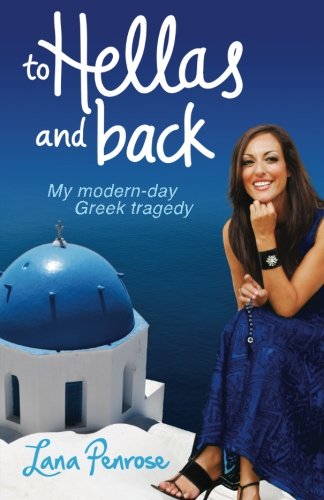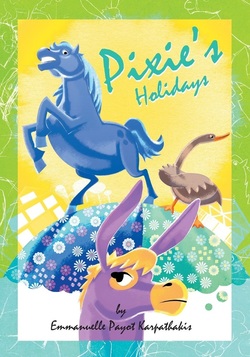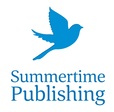|
Lana Penrose is the author of To Hellas and Back and Kickstart My Heart first published by Penguin/Viking. She is a former record company promotions manager, music journalist and MTV producer. She has appeared on national breakfast television and she and her books have featured in numerous newspapers, magazines and radio shows.  Tell me about your book. What is it about? Can you describe it in just a few sentences? To Hellas and Back is the story of a woman unraveling in Greece (me), pulling herself together, then spontaneously combusting! A bittersweet bestselling memoir, I believe it nicely demonstrates the different ways in which my partner and I adjusted to a life less ordinary (he, very well, me, um … not so much). My other book, Kickstart My Heart, is about me negotiating life in London like Bridget Jones with an axe through her head. Why did you write it? I wrote ‘To Hellas and Back’ because in the absence of a solid support network it at times felt like my greatest confidante. I found myself confiding to the page which was extremely cathartic. I also wrote it because I wasn’t legally permitted to work in Greece. I became my partner’s ‘manbag’ with plenty of time on my hands and paralleling that to my former existence as a frantic television producer, authoring a book seemed the only thing to do. What qualifies you to write this book? I was qualified to write it because I lived it! Sometimes life as an expat straddling cultural nuances or as someone going cross-eyed in a cross-cultural relationship can be confusing, so I faithfully documented my experiences to make myself and others laugh (and cry). Why do you think your book needed to be written? What will it do for other people? How will it help? Did you have any competition? You know how travel tales generally depict life abroad as idyllic affairs, full of Tuscan home renovations, cooking extravaganzas and unexpected revelations that lead to enlightenment and/or falling in love? Well, my story comes closer to ‘Eat, Pray, Love’ face-plowing into a steaming mound of moussaka! I guess my failure makes for good reading. Who do you think will read your book? What made you think that there was a market for it? If your book has been out for a while, what proof do you have that you were right? Although ‘To Hellas and Back’ has been surprisingly embraced across the board, nobody ‘gets’ it like expats or those in cross-cultural relationships. It has brought comfort to many already, which brings me comfort as well. So many people go through similar experiences to mine, only few talk about it because it highlights our human frailty. As one journalist put it, “‘To Hellas and Back’ breaks the code of silence of overseas experiences”. It does not matter how good a book is, or how good your writing is if no one knows about it. What steps have you taken or do you plan to take to promote your book? Are you a speaker or trainer? Do you have a blog? A website? A newsletter? Do you use Facebook, Twitter or other social media tools? What about press releases and sending out review copies and free articles? Have you had any other ideas? Which methods do you think work best and can you give me any examples? Some people quite like self-promoting. I’m not one of them. That said, I understand how crucial publicity is thanks to first hand experience. I was privileged to have my own publicists at Penguin and it is through their efforts that my books have received so much traction to date. How did you publish your book? Did you find an agent, a publisher or did you publish it yourself? Please describe your process and tell us how you found the experience. Is there anything you would definitely do again or never do again? My books were first published by Penguin/Viking. I did everything sans agent, considering they all told me that my work was rubbish. Funny, considering ‘To Hellas and Back’ went on to become a bestseller! I knew they were wrong and was incredibly persistent. Now that the new wave of publishing has hit the industry like a tsunami, I’ve decided to try it out for myself to see how it goes. What I’ve discovered so far is that self-publishing is positively liberating. You have control over everything. However, it takes up more time, and I’ve already stumbled across my fair share of imposters posing as ‘experts’ poised to ‘help’. After working with pros, I find that disappointing. What was your biggest challenge regarding the writing of your book? How have you overcome that? Writing a quality book takes time – in my case a couple of years apiece. Despite the millions of books being churned out today, it’s harder than most people think to produce one. It seems that there’s something within us writers that can’t be switched off. From a logical perspective (if you’re trying to etch out a living from it), it hardly makes sense to continue, yet continue we do! Now you have written this book, what has writing done for you, your family, your self-esteem or your business? Writing my books was cathartic. Getting my first publishing deal saw me burst into a flood of tears, because I’d always thought that if I could just get a book out detailing my plight, it would help me understand the purpose of going through it in the first place. Don’t get me wrong – I didn’t endure incarceration or physical torture, but it was still a trying time in my life. Through this, my greatest reward has been having people read my books and connect with the story. I now know that I’m not alone in what I experienced. I’ve lost count of how many people have written to say that I articulated their personal experiences almost identically. So through my own craziness, I’ve made others feel sane, if that makes any sense! If you were to give advice to someone else who is thinking about writing a book, what would be your number one tip? Persevere. Never give up. Everything is rubbish to begin with. Don’t listen to idiots. Keep polishing away and do it because you love it.  Pixie’s Holidays Pixie, a little donkey who moved to a new house, returns to her old home for the first time. Oh no! She does not recognize the place. Worse still, her friend Lila does not remember her. Pixie is very sad, but still finds a way to have a wonderful vacation. This charming story is for young children negotiating relocation – and managing the new and old friendships that come with a move. Pixie’s Holidays will help young children to understand the emotions they may go through as a result. REVIEWS “A touching and wise portrayal of the challenges often faced by young expatriates. Pixie’s Holidays is the perfect resource for parents to address the natural yet conflicting emotions that expat children experience as they attempt to understand and strike a balance between new friends and old.” Alison Cavatore, Founder, CEO and Editor-in-Chief of Global Living Magazine, GlobalLivingMagazine.com “Early relationships help children to build and maintain their own identities, and even though difficulties to let go are normal (even for grown-ups), learning to deal with them is essential.Pixie’s Holidays explores this theme in a truthful manner.” – Simone T. Costa Eriksson, co-author of The Mission of Detective Mike Moving Abroad, available on Amazon, interculturalplus.com “Pixie’s Holidays provides an opportunity for parents and children to explore together the experience of home visits through reading about Pixie and her old friend. Like Pixie’s New Homethis book will be a helpful addition to the expat family, pre-school or international school library.” – Trisha Carter, Cross Cultural Psychologist, Cultural Intelligence Collective, cicollective.com This month’s Inspirer has been written for all those people who know they have a book in them, or could write some poetry, or articles, or blogs, or short stories, or a book to sell after their workshops … but don’t…
Choice can be crippling I remember reading about a woman who had recently returned to live in the UK after many years living in a remote corner of Africa. After having a limited choice of food from which to choose she suffered a complete meltdown on entering a British supermarket. It was easier to know she had the choice of gristly beef or no meat for supper than to decide between an array of different meat-products. I think she left the shop empty-handed. After nine months of renovation, during which all our weekends were spent in tile or tap shops, I too began to suffer with decision fatigue. Did I really have to choose between hundreds of shapes, finishes and colours? It was only a downstairs loo? In the end, I literally walked away, saying: “just as long as it is turquoise I’m happy.” Barry Schwartz does a super TED talk on the Paradox of Choice in which he explains why too much choice can be a bad thing. “The more options there are, the easier it is to regret anything at all that is disappointing about the option that you chose,” he says. Choice can be just as crippling for the writer. When I needed to earn enough money from my writing to pay school fees, I simply worked out which type of writing earned me the most per hour, and focused on that: writing articles for newspapers. The lack of choice combined with my need was all the motivation I needed. But now that I make the bulk of my income as a publisher not a writer, writing has become my ‘hobby’ again. My luxury. It is something I love to do and something I could not live without. I can choose what I write… but mostly I don’t. So what is the magic ingredient that makes us choose to write rather than procrastinate and to dream. Is it commitment? Having the luxury of being able to choose what I write is not necessarily a good thing. Mostly I choose not to bother. But if I had a commission, a deadline or a goal I’d write all right. You see, I choose to write my Monthly Inspirer and you are reading it now. I chose to do it because I love writing in this column style. And I continue to choose to write it because you tell me you actually read it and find it useful. I write this, my monthly Inspirer column/blog because I made a commitment to do so and because your feedback keeps me going. Back in April 2002 I pledged to write my Inspirer on the first of every month. And I have stuck to it. When I committed to taking part in The Ultimate Blog Challenge, which meant I had to blog every day for a month, I stuck to that too. When I had been commissioned to write a monthly column forThe Hague Online and a quarterly column for Global Connection I did so. And when I went to run the week long residential writing course in Tuscany back in September I pledged to write a blog a day from there. So I did. Each time I made a commitment I also did one other thing. I told not just one person but several people I was making that commitment, or I was commissioned to make that commitment. If I made a commitment I did not keep it to myself. Being answerable to someone made it harder to let myself down. This is why, many of my books began as workshops. If I organised a workshop I’d be forced to set a date. When I set a date and students signed up I’d have to write the handouts. And once I had the handouts I had the bones of a book. That’s what happened with A Career in Your Suitcase, Release the Book Within, Definite Articles, Grow Your Own Networks, Find Your Passion, Write Your Life Stories and next … The Naked Writer. I taught the last class of the six part series last month and already have 30,000 words of notes prepared. Turning that into a book will be easy. Is it a deadline? Sometimes a deadline helps me not only to start writing but to finish it too. The NaNoWriMo month (National Novel Writing Month) takes place in November every year and those who join pledge to write a certain number of words every day during that month towards a novel. Anne O’Connell, who wrote @home in Dubai did NaNoWriMo in 2011 and next month will see the publication of the novel she wrote then, called Mental Pause. I have read and reviewed it and been lucky enough to see a sneak preview of its cover and can assure you that the commitment to the deadline meant that Anne chose to get that darn novel written! I used to find poetry competitions were a great motivator and entered many run by the National Poetry Foundation and Writers News. I also recommend Mslexia magazine. Last year, if you remember, I pledged to make 2013 the year I broke into performance poetry. In order to do this I booked myself an open mic slot at a local poetry cafe and also in a Christmas Revue. I also performed at my uncle’s birthday party. They were small events but they forced me to learn some poems by heart and perform them. They actually happened because I made a commitment and had a deadline. So, I conclude If you really want to write… I mean REALLY… then I urge you to do three things:
|
�
All the latest news from the team at Summertime Publishing
As an Amazon Associate, we may earn a commission from qualifying purchases. This does not affect the price you pay or your consumer rights.
Archives
June 2024
|

